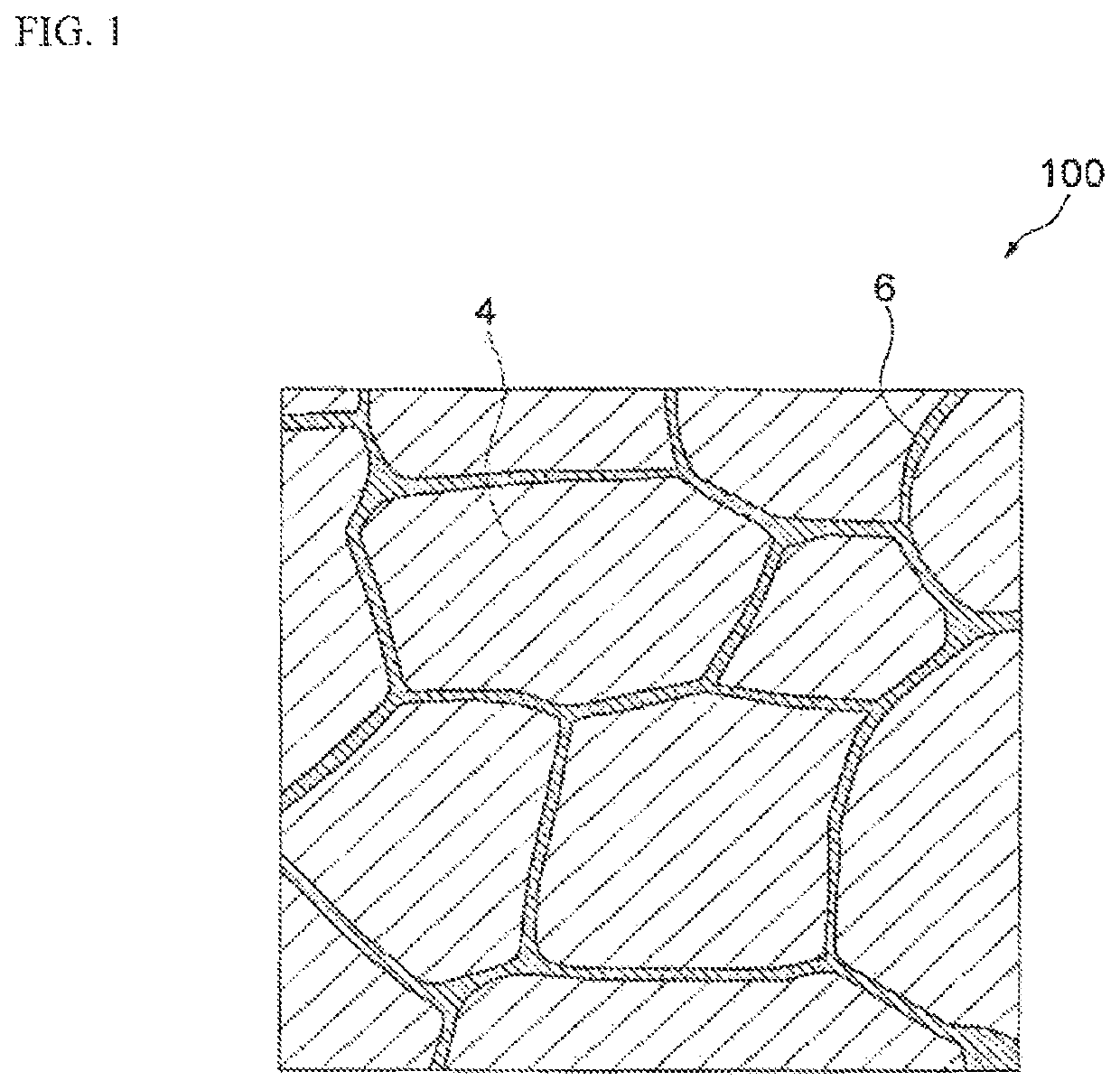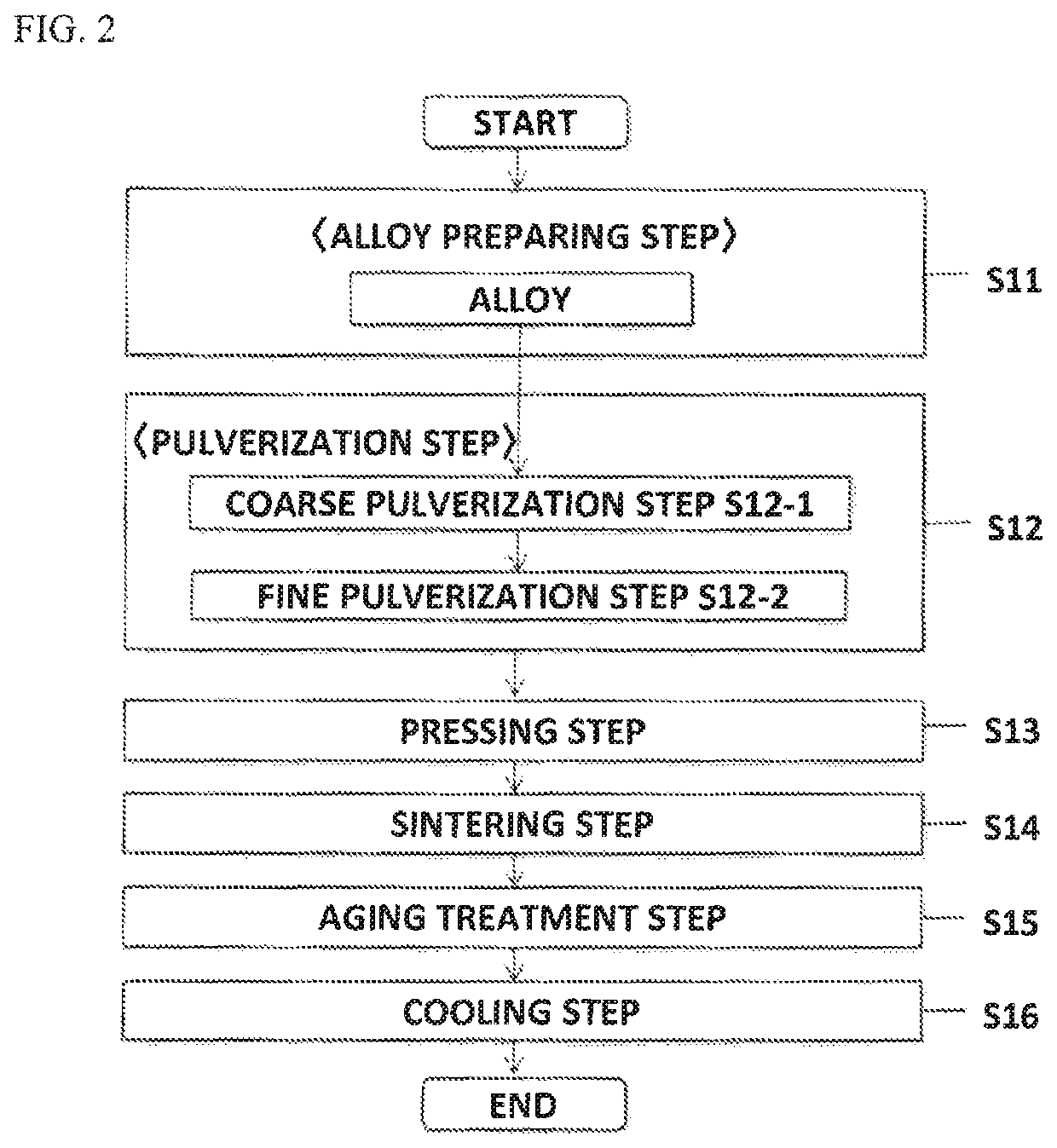R-T-B based permanent magnet
a permanent magnet and rtb technology, applied in the field of rtb based permanent magnets, can solve the problems of insufficient coercivity and squareness ratio, inability to obtain sufficient coercivity, and easy occurrence of abnormal grain growth during sintering. achieve the effect of high coercivity
- Summary
- Abstract
- Description
- Claims
- Application Information
AI Technical Summary
Benefits of technology
Problems solved by technology
Method used
Image
Examples
first embodiment
[0051]The first embodiment of the present invention is directed to an R-T-B based sintered magnet that is a kind of R-T-B based permanent magnets.
[0052]The R-T-B based sintered magnet according to the first embodiment of the present invention will be described. As shown in FIG. 1, an R-T-B based sintered magnet 100 according to the present embodiment contains main phase grains 4 composed of R2T14B type compound and grain boundaries 6 present among the main phase grains 4.
[0053]The main phase grains contained in the R-T-B based sintered magnet according to the present embodiment are composed of R2T14B type compound having crystal structure of R2T14B type tetragonal.
[0054]R represents at least one kind of rare earth elements. Rare earth elements are Sc, Y, and lanthanoid elements belonging to Group 3 in the long-periodic table. For example, lanthanoid elements include La, Ce, Pr, Nd, Sm, Eu, Gd, Tb, Dy, Ho, Er, Tm, Yb, Lu etc. Rare earth elements are divided into light rare earth elem...
second embodiment
[0107]The second embodiment of the present invention is directed to an R-T-B based permanent magnet manufactured by hot working. Matters of the second embodiment that are not described below are identical to those of the first embodiment. The term of “sintering” in the first embodiment shall be replaced as necessary.
[0108]The method for manufacturing the R-T-B based permanent magnet according to the present embodiment has the following steps.
[0109](a) Melt rapid cooling step for melting a raw material metal and rapidly cooling an obtained molten metal to obtain a ribbon
[0110](b) Pulverization step for pulverizing the ribbon to obtain a flaky raw material powder
[0111](c) Cold forming step for performing cold forming to the pulverized raw material powder
[0112](d) Preliminary heating step for preliminarily heating the cold-formed body
[0113](e) Hot forming step for performing hot forming to the preliminarily heated cold-formed body
[0114](f) Hot plastic working step for plastically defor...
examples
[0138]Hereinafter, the invention will be described in more detail based on the examples, but is not limited thereto.
PUM
| Property | Measurement | Unit |
|---|---|---|
| grain size | aaaaa | aaaaa |
| grain size | aaaaa | aaaaa |
| residual magnetic flux density | aaaaa | aaaaa |
Abstract
Description
Claims
Application Information
 Login to View More
Login to View More - R&D
- Intellectual Property
- Life Sciences
- Materials
- Tech Scout
- Unparalleled Data Quality
- Higher Quality Content
- 60% Fewer Hallucinations
Browse by: Latest US Patents, China's latest patents, Technical Efficacy Thesaurus, Application Domain, Technology Topic, Popular Technical Reports.
© 2025 PatSnap. All rights reserved.Legal|Privacy policy|Modern Slavery Act Transparency Statement|Sitemap|About US| Contact US: help@patsnap.com


